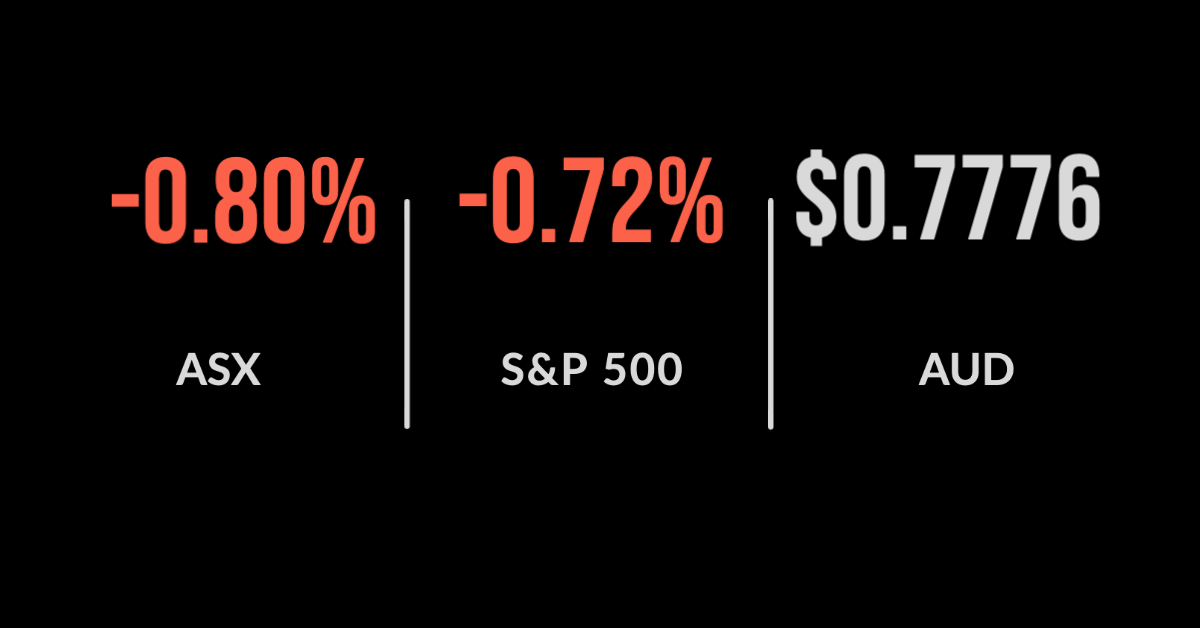ASX caps seventh consecutive monthly gain
Seventh consecutive monthly gain, Beach Energy smashed, ANZ takes $817m profit hit
The ASX200 (ASX:XJO) finished Friday on a weaker note, down 0.8% and 0.5% for the week, however was able to deliver a seventh consecutive monthly gain, finishing 3.5% higher for the month of April.
The news of the day was the capitulation in Beach Energy’s (ASX:BPT) share price losing 25% of its value after reporting a 5% fall in production and restating reserve levels after another miscalculation. Investors are clearly tired of the uncertainty.
ANZ Bank (ASX:ANZ) pre-warned investors of an impending $817 million hit to cash profit, due to losses in a number of subsidiaries, the devaluation of their ANZ Share trading platform, and more customer remediation charges.
Across the week it was Nib Holdings (ASX:NHF) leading the way, jumping 14.7% after upgrading profit expectations.
Woolworths (ASX:WOW) was among the weakest, falling over 3% as it struggles to keep up with heightened lockdown-induced expectations; importantly they continue to outperform rival Coles (ASX:COL).
The tech sector continues to sell off, down 2.3%, with recent IPO Nuix (ASX:NXL) hitting a record low after falling 10.2% over the week.
US market finish shy of record, Amazon stuns, reflation trade ahead
US markets struggled closing out the week, the Dow Jones fell 0.5%, S&P500 0.7%, and the Nasdaq among the hardest hit, down close to 1.0%.
It was a flat result on what was an important week for earnings results but another in a long line of record months.
Through April, the Dow managed to deliver another positive month finishing 2.2%, with the Nasdaq at 3.6%, and the S&P500 benefitting from the likes of Apple, Amazon, and Berkshire to jump 4%.
The weakness on Friday came as comments from the Dallas Federal Reserve flagged concerns about inflation and suggests that the bond-buying program should be slowed sooner than expected.
The broad-based nature of the reflation trade is on full show with the S&P500 achieving a rare record with 95% of its 500 constituents trading above their 200-day moving average.
Amazon (NYSE:AMZN) once again stunned the bears, delivering a 44% increase in revenue in the fourth quarter to US$108.5 billion, with management suggesting the surge to online sales is set to continue. They have projected the final quarter to improve further, with sales between US$110 and $116 billion forecast.
Amazon Web Services, the cloud computing business, delivered 32% sales growth of its own whilst the group’s advertising network saw revenue nearly double, up 77%, albeit off a low base. Shares were broadly flat.
Pandemic will hit, immigration slowing the recovery, inflation is already here
There is little doubt anyone missed the heartbreaking footage of the events occurring in India, yet it doesn’t end there. COVID-19 cases are now spiking on nearly every continent, increasing the threat of mutations and making it clear that the virus will not be leaving us anytime soon.
Investors must be vigilant in this environment, never has the divergence between the performance of companies, within and across sectors, been so wide and uncertain.
Australia’s immigration-driven economy is clearly becoming a headwind amid the pandemic, with anyone visiting a café, restaurant, or bar in recent weeks no doubt hearing about the lack of skilled staff available for many smaller businesses across multiple industries.
It is clear that this will become a drag on the economic recovery and eventually the property market should our borders remain squarely closed as the pandemic rages on.
Anyone waiting for inflation to return needs to wait no more. It’s back, whether it is showing up on headline figures or not.
Among the most common statements in the latest round of quarterly updates were comments like ‘input costs are rising’, ‘supply shortages are impacting sales’, and hopes that these costs will be passed onto consumers.
It’s clear that inflation has now spread beyond asset prices, the question is whether it sustains or is just transitory.







